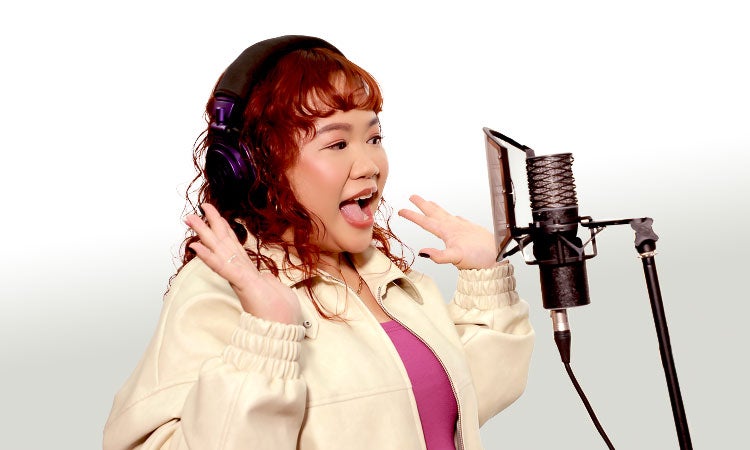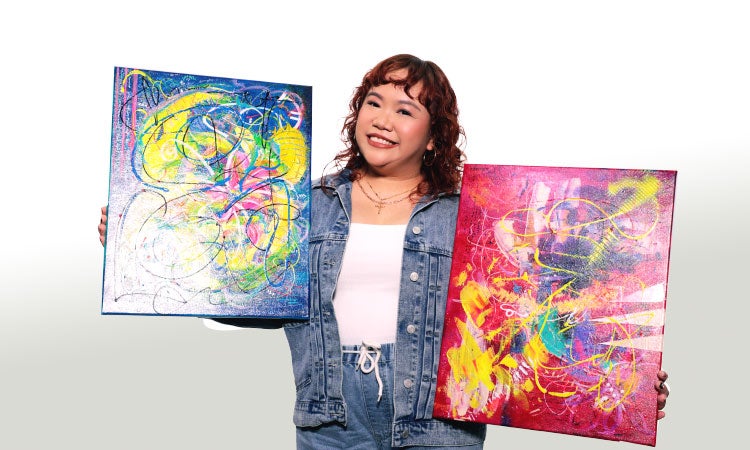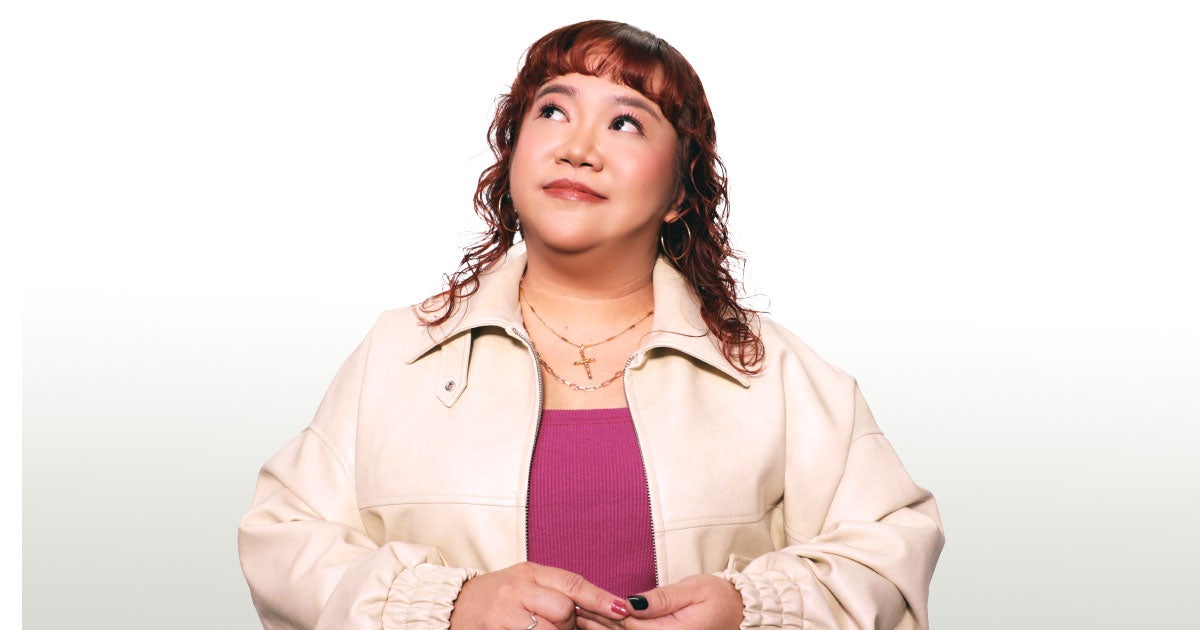On paper, Ariane Astorga’s life could be mistaken for an Antoinette Jadaone film about a precocious child who always found herself onstage. She was the bibo kid, the one volunteered to lead prayers, the three-year-old who joined Little Miss Philippines on Eat Bulaga. But beneath the sparkle, her journey was never effortless. Every laugh, every stage, every win was negotiated against hunger, pressure, and the stubborn insistence that her creative voice deserved to be heard.
The Saleslady’s Daughter
Ariane’s first teacher was her mother, a determined Avon saleslady who kept the family afloat. It wasn’t a glamorous life: long afternoons spent going door-to-door, and late nights when their living room transformed into a meeting hall where she urged other women to push harder, sell more, and believe in themselves. At six years old, Ariane often tried to sneak a peek as her mother rallied her team. To keep her included, her mom would give her small chores, ask her to lead a prayer, or sing a song—gentle reminders that she was part of the moment too. “Those early glimpses taught me discipline and focus long before I realized I’d need them for my own path,” she says.
“My mom was always the loudest voice in the room,” Ariane remembers. “I think I learned early that sometimes, that’s what survival sounds like.”
Dreams in a World of Privilege
When she earned a scholarship to De La Salle University, it was a dream come true but also a test of endurance. Her tuition was 75% covered, but the remaining costs and daily living expenses were hers to solve. La Salle was a world of privilege, where classmates talked about weekend shopping trips and Starbucks runs. Ariane calculated whether she could afford another meal that day.
“If I had an event after class, that meant another meal. So I’d choose, lunch, or dinner,” she says quietly.
At home, the family’s dining table carried a different weight. By day it was where meals were shared; by night, once everyone had gone to bed, it became her desk. In the quiet, Ariane spread out her notebooks and finished her homework, carving out discipline in those late hours. For her, even studying required resilience, shaped in the stillness of a house already asleep.
It’s a contrast that feels even sharper today, when TikTok is filled with callouts of the so-called “corrupt kids” — the sons and daughters of politicians, contractors, and businessmen flaunting their privilege online. For Ariane, that divide wasn’t abstract. She lived it. Studying in an elite school meant constantly being reminded that she didn’t come from wealth. Her classmates didn’t have to worry about skipping meals or maintaining a scholarship to stay enrolled. She did. And that’s what made every event she hosted, every grade she kept high, not just an achievement but an act of survival.
“Maybe my coping mechanism was excellence,” she admits. “Let’s not focus on the things I don’t have. Here, look at the amazing things I did.”

A Voice in the Machine
After graduation, Ariane chose the safe route: a corporate marketing job at an IT company. It was stability, something her family needed. But in that quiet office of cubicles and dress codes, she felt herself shrinking. “Every day I wore heels and a blazer, but it felt like the silence was swallowing me whole,” she says.
Her bright voice, however, refused to stay hidden. She was asked to host company events for free, then became the default voice for clients’ phone systems. “Thank you for calling Meralco…” she laughs, remembering the endless scripts she recorded. Her first real paycheck for voice work came from recording thousands of permutations of bill dates and numbers. “It was tedious, but oh my God — money!”
Two years in, she resigned. Her bosses tried to keep her, offering promotions and raises. But she couldn’t ignore the feeling that her creative spirit was suffocating. “I didn’t know where I was going yet,” she admits. “But I knew it wasn’t here.”
The Breakthrough
Armed with little more than determination, she cold-called a studio: Hit Productions. She auditioned, recorded demo tapes, and within weeks landed a Sprite commercial. From there, she hustled her way into the bloodstream of advertising. She became the voice behind jingles, TVCs, and AVPs — sometimes even singing the jingles herself. “I did both the VO and the jingle for Saridon,” she beams.
She still remembers the moment it hit her. On a ferry between Leyte and Cebu, far from the city, a shampoo commercial played on the communal TV. The voice was hers. “We were in the middle of the ocean, and I thought — wow, my voice traveled farther than I ever could.”
Big Stages, Bigger Pressure
By this time, Ariane had become a fixture in the industry: the voice you’ve heard a hundred times but never seen. She sold you shampoo in a 30-second spot, welcomed you to a hotline with a cheerful “Press 1,” even sang the jingle that got stuck in your head. Her voice was everywhere, yet her face remained unknown as was the paradox of voice acting.
But nothing prepared her for the pressure of stepping out of the recording booth and into the global spotlight. Her proudest moment came at the SEA Games, when she was chosen as the live voice for gymnastics and women’s football awarding ceremonies.
The stakes were higher here: VIPs in the stands, international media watching, athletes waiting for their names to be called. Minutes before the program, handwritten slips with difficult foreign names were thrust into her hands. She quickly searched pronunciations on her phone, “If I messed up, the country’s reputation is at stake!”
She didn’t. Her calm, clear delivery carried the pride of a nation.
Challenges in a Changing Industry
But even as her career gained momentum, Ariane couldn’t ignore the cracks in the industry. Payments for VO work often arrived late—sometimes years after a project wrapped—and overshadowing it all was the growing threat of AI.”
Clients sometimes want a line to sound concerned but not too concerned, hopeful but not too happy. That’s nuance AI can’t replicate…at least not yet,” she says. She has joined VocAlliance, a group of Filipino voice artists pushing for contracts that protect their voices from unauthorized AI use. “At the end of the day, you have to prove your value as a human. Show what a machine can’t do.”

Painting Bright
When the pandemic brought studio recordings to a halt, Ariane found herself with unexpected quiet. For someone who had always defined herself through constant work, it was disorienting but also a chance to return to the other art forms she once dreamed of. As a child, she had envied classmates who could afford summer art lessons or proper supplies; now, for the first time, she had the means to buy her own.
“When I paint, it’s like my soul speaking in colors. Bright colors, because deep inside, I’m a bright, happy person,” she says.
Unlike her commercial work, painting came with no deadlines, no revisions, no brand lockouts. It was hers alone. And she resisted the pressure to turn it into another hustle. “Not everything has to be sold. If it makes you happy, that’s enough.”
The Happy Ending (So Far)
Today, Ariane records in her own home studio, no longer crouched in a cabinet to block echoes, but in a space she built herself. She balances VO projects with painting, podcasting, hosting events, and content creation. She still dreams of voicing a Disney princess or a video game character. “It would be so cool to play a character with a unique Filipino backstory,” she smiles.
And while TikTok scrolls may be filled with children flaunting privilege, Ariane is proof that another path exists—one built on talent, persistence, and faith that hard work matters. “I believe you should use your talents to make the world a better place,” she says.
From watching her mother build a living through sheer grit to becoming a woman whose voice is heard in podcasts, at events, and across nationwide campaigns, Ariane has built a life on her own terms. She may still be the face you don’t know, but she is undeniably the voice you do. And while her story is still being written, it’s already rich with the kind of happy ending that comes from refusing to fade.

